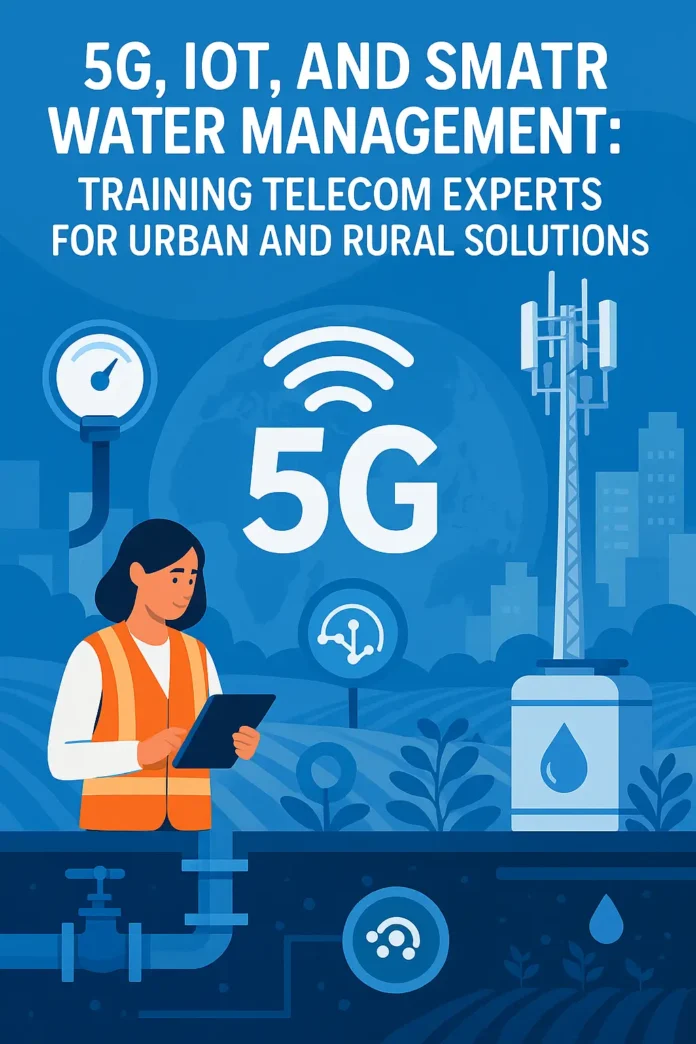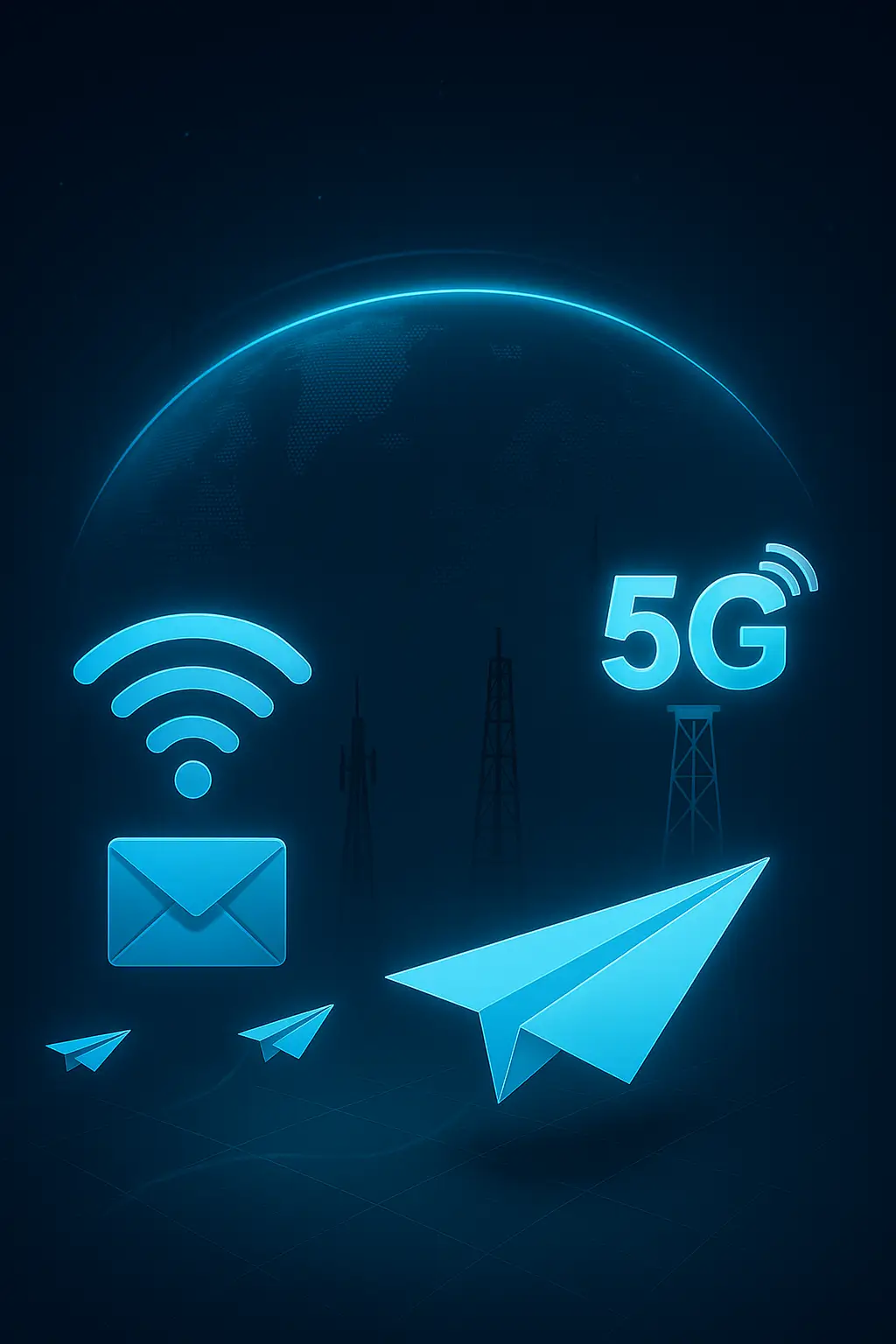5G, IoT, and Smart Water Management: Training Telecom Experts for Urban and Rural Solutions
Water is one of our planet’s most precious resources, yet billions of liters are lost every day due to leaks, inefficiencies, and aging infrastructure. As urban populations surge and rural communities face new environmental and economic challenges, the need for smarter water management has never been greater. Enter 5G and the Internet of Things (IoT): a powerful combination that is revolutionizing how we monitor, distribute, and conserve water across cities and countrysides alike.
How 5G and IoT Are Changing Water Management
5G’s ultra-fast, low-latency networks are making it possible to connect thousands of IoT sensors and devices in real-time. These sensors can be placed throughout water pipelines, reservoirs, irrigation systems, and treatment plants to provide a constant stream of data—enabling instant detection of leaks, monitoring of water quality, predictive maintenance, and optimized water usage.
Key Innovations
- Leak Detection: IoT sensors powered by 5G can instantly alert operators to even the smallest leaks, preventing water loss and infrastructure damage.
- Smart Metering: Real-time metering helps utilities and consumers track usage, detect abnormal consumption, and promote conservation.
- Automated Irrigation: In agriculture, soil moisture sensors and weather data combine via 5G to trigger irrigation only when and where it’s needed, saving water and boosting crop yields.
- Flood and Drought Alerts: Smart monitoring systems warn communities about impending floods or droughts, supporting faster, data-driven response.
Urban Benefits: Building Sustainable Smart Cities
In cities, aging water systems are a major challenge. With 5G-enabled IoT, municipalities can:
- Rapidly detect and address leaks, reducing water loss and repair costs.
- Monitor water quality in real-time to protect public health.
- Integrate water management with other smart city services for greater efficiency.
- Offer transparent usage data to citizens to encourage responsible consumption.
Rural Advantages: Empowering Agriculture and Remote Communities
Rural areas and farms face distinct water challenges, from unpredictable weather to limited access to technical expertise. 5G and IoT make it possible to:
- Remotely monitor wells, pumps, and irrigation systems, minimizing labor and maximizing uptime.
- Use precision agriculture techniques to apply water only where and when crops need it.
- Bring advanced monitoring and management to areas previously lacking reliable connectivity.
Telecom Training: Building the Workforce for Smart Water Management
This wave of innovation is driving demand for telecom professionals with specialized skills in 5G, IoT, and smart infrastructure. Key training and certification opportunities include:
- 5G Training & Certification: Understanding 5G architecture, network slicing, and deployment for IoT.
- Telecom Certification: Gaining credentials in telecommunications to work with critical infrastructure.
- ICT Courses: Learning about IoT system integration, data analytics, and security best practices.
- Online Telecom Training: Flexible e-learning options for upskilling in 5G, IoT, and smart water management.
- Telecom Engineer Courses: Specialized programs for designing and maintaining rural and urban water IoT networks.
Career Opportunities in Smart Water Management
The intersection of 5G, IoT, and water management is generating new professional roles, including:
- Smart Infrastructure Engineer
- IoT Solutions Architect for Utilities
- Network Security Specialist (Critical Infrastructure)
- Field Technician for Rural IoT Deployments
- Data Analyst for Water Management Systems
Professionals with 5G training, telecom certification, and experience with ICT courses focused on IoT will have a competitive edge in this fast-growing sector.
How to Get Started
- Identify your area of interest: urban infrastructure, rural/agricultural solutions, or security.
- Complete foundational telecom training: LTE training, 4G training, and 5G training.
- Specialize with IoT and smart utility courses—many ICT courses now focus on smart city and smart agriculture applications.
- Pursue telecom certification from reputable organizations, including programs with hands-on labs and real-world projects.
- Engage with the industry through professional associations, conferences, and pilot projects.
Conclusion
5G and IoT are reshaping water management for both urban and rural communities—delivering efficiency, sustainability, and resilience. As adoption accelerates, the need for skilled telecom professionals with up-to-date training and certification will only grow. By investing in advanced 5G training, telecom certification, and ICT courses, you can play a pivotal role in building smarter, more sustainable water systems for the world.
Benefit from Massive discount on our 5G Training with 5WorldPro.com
Start your 5G journey and obtain 5G certification
contact us: contact@5GWorldPro.com


